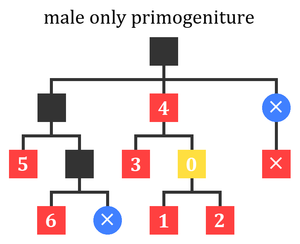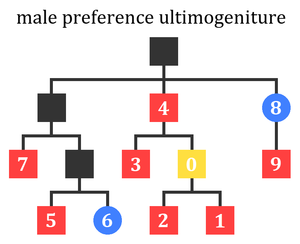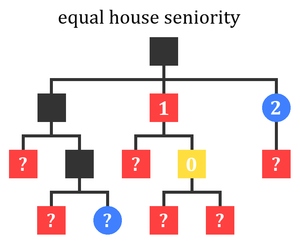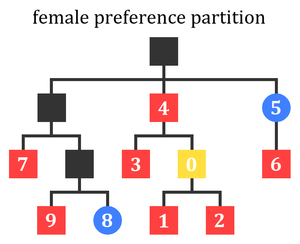Ck3 Partition Vs Confederate Partition
Succession involves the inheritance of ![]() titles,
titles, ![]() majuscule,
majuscule, ![]() men-at-arms and artifacts: information technology triggers when a grapheme dies or abdicates.
men-at-arms and artifacts: information technology triggers when a grapheme dies or abdicates.
Player/primary/inferior heir [edit | edit source]
![]() An heir is anyone who expects to inherit something. The graphic symbol who inherits a ruler'south primary title is known every bit their principal heir, while the character who the player will go on playing as is known equally their thespian heir. If the player's main heir is of their dynasty, said character will always be their player heir. Heirs who practice non look to inherit the primary title are chosen junior heirs.
An heir is anyone who expects to inherit something. The graphic symbol who inherits a ruler'south primary title is known every bit their principal heir, while the character who the player will go on playing as is known equally their thespian heir. If the player's main heir is of their dynasty, said character will always be their player heir. Heirs who practice non look to inherit the primary title are chosen junior heirs.
Eligibility [edit | edit source]
Some ![]() laws and the doctrines of the decedent's religion affect who is eligible to inherit.
laws and the doctrines of the decedent's religion affect who is eligible to inherit.
- The gender law determines when a grapheme of a particular gender is eligible. With male preference, women are ineligible as long as they have eligible brothers; vice versa for female preference.
- Some traits cause disinheritance. Usually descendents of a graphic symbol with the trait is likewise disinherited if the line of succession passes through them.
- Theocratic characters (meaning holders of counties whose capital is a temple nether
 Theocratic faiths) are ineligible.
Theocratic faiths) are ineligible.
Realm succession [edit | edit source]
![]() The realm succession law applies to every title without a unique title succession law.
The realm succession law applies to every title without a unique title succession law.
In the family trees beneath:
- numbers denote the line of succession, with 0 being the current holder
- characters marked with an X are ineligible to inherit
- red squares are males
- blue circles are females
- black squares/circles are dead characters
Single heir [edit | edit source]
Primogeniture [edit | edit source]

All titles are inherited by the oldest eligible child. Note that a dead kid's progeny takes precedence over younger siblings. If no eligible descendants exist, the ruler's oldest eligible sibling is preferred.[1] If lateral branches provide no candidate, the game moves up to the primary parent* and repeats the aforementioned steps.
*the male parent if patrilineal marriage, the mother if matrilineal matrimony
Ultimogeniture [edit | edit source]

All titles are inherited by the youngest eligible child. Annotation that a expressionless child'southward progeny takes precedence over older siblings. If no eligible descendants exist, the ruler's youngest eligible sibling is preferred.[one] If lateral branches provide no candidate, the game moves upward to the primary parent* and repeats the aforementioned steps.
*the male parent if patrilineal marriage, the mother if matrilineal marriage
House seniority [edit | edit source]

All titles are inherited past the oldest eligible house member. With male preference, younger men take precedence over older women; vice versa for female preference.
Multiple heirs [edit | edit source]
(Regular) partition [edit | edit source]

- The oldest child is given the principal championship along with its de facto capital and any college title that holding belongs to de jure.
- All
 empires are distributed in social club. The oldest child with the fewest empire titles takes priority. If a junior heir received titles, they are also given any lower title that's theirs de jure, and receive no more titles in the following steps.
empires are distributed in social club. The oldest child with the fewest empire titles takes priority. If a junior heir received titles, they are also given any lower title that's theirs de jure, and receive no more titles in the following steps. - All
 kingdoms are distributed in club. The oldest child with the fewest empire plus kingdom titles takes priority. If a junior heir received titles, they are also given any lower championship that's theirs de jure, and receive no more titles in the following steps.
kingdoms are distributed in club. The oldest child with the fewest empire plus kingdom titles takes priority. If a junior heir received titles, they are also given any lower championship that's theirs de jure, and receive no more titles in the following steps. - All
 duchies are distributed in order. The oldest child with the fewest empire plus kingdom plus duchy titles takes priority. If a junior heir received titles, they are likewise given any lower title that's theirs de jure, and receive no more titles in the following steps.
duchies are distributed in order. The oldest child with the fewest empire plus kingdom plus duchy titles takes priority. If a junior heir received titles, they are likewise given any lower title that's theirs de jure, and receive no more titles in the following steps. - All
 counties are distributed in order. The oldest child with the fewest county titles [2] takes priority.
counties are distributed in order. The oldest child with the fewest county titles [2] takes priority. - All
 baronies go to whomever owns their respective counties.
baronies go to whomever owns their respective counties.
Notes:
- If an eligible child dies but had eligible children of their own, their oldest eligible child volition take their place during succession.
- Junior heirs tin can and will only exist vassalised if their rank is lesser than the primary heir.
- Titles prior to succession are taken into account as well.
- Meet Primogeniture if the ruler has no eligible progeny.
- A junior heir may receive a different title than expected because they already own land within the given title.
- If the upper-case letter belongs to a higher title which is equal in rank to but not itself the primary, said title will not be inherited along with the capital letter.
Amalgamated sectionalization [edit | edit source]
Prior to Partition, new titles, of the same tier as the primary, volition be created if enough of their de jure territory is held.
Loftier segmentation [edit | edit source]
Like Partition, except the master heir is commencement given half the titles in each footstep; the balance gets divided among all junior heirs every bit usual. If the number of titles is odd, the primary heir is given one actress.
Title specific succession [edit | edit source]
![]() A championship succession constabulary can be assigned to individual titles; besides the gender laws, these are all a form of elective succession. Options are restricted to certain ranks, cultures and/or titles. If the chief title has a unique title succession police, its de facto capital will not be inherited along with information technology: it goes to whomever would have been the primary heir according to realm succession alone.
A championship succession constabulary can be assigned to individual titles; besides the gender laws, these are all a form of elective succession. Options are restricted to certain ranks, cultures and/or titles. If the chief title has a unique title succession police, its de facto capital will not be inherited along with information technology: it goes to whomever would have been the primary heir according to realm succession alone.
Championship claim inheritance [edit | edit source]
The gender law determines which children inherit claims on their parents' titles. ![]() Bastards,
Bastards, ![]() bastard founders,
bastard founders, ![]() disinherited kin and
disinherited kin and ![]() eunuchs never receive claims. Eligible children are given
eunuchs never receive claims. Eligible children are given ![]() pressed claims on titles they did not inherit nor vassalise. If the parent held pressed claims themselves,
pressed claims on titles they did not inherit nor vassalise. If the parent held pressed claims themselves, ![]() unpressed claims are inherited in their stead. Unpressed claims cannot be passed down, but will go pressed if used in an inconclusive state of war. Note that a deceased kid's place holder will not receive the claims their parent would have inherited.
unpressed claims are inherited in their stead. Unpressed claims cannot be passed down, but will go pressed if used in an inconclusive state of war. Note that a deceased kid's place holder will not receive the claims their parent would have inherited.
- Male person/female just: Simply sons/daughters inherit claims.
- Male person/female preference: Both daughters and sons inherit claims.
- Equal: Both daughters and sons inherit claims.
The religion'southward view on gender determines which children go ![]() implicit claims during their parent'south lifetime. Notation that a deceased child'due south place holder will receive implicit claims in their stead, but simply if they're of the appropriate sexual activity.
implicit claims during their parent'south lifetime. Notation that a deceased child'due south place holder will receive implicit claims in their stead, but simply if they're of the appropriate sexual activity.
Majuscule/men-at-arms inheritance [edit | edit source]
The primary heir receives all capital (gold) and men-at-arms upon death.
Artifacts [edit | edit source]
[WIP]
Courtroom Artifacts that are displayed at your Majestic Courtroom (DLC required) will be passed on to your Primary Championship heir.
Inventory Artifacts, on the other mitt, appear to not always get passed on and may exist lost on succession.
Notes [edit | edit source]
- If an unlanded character inherits a duchy+ title, they volition automatically usurp a county in their realm, preferably the de jure majuscule. If none of that title'south de jure land is controlled, or the title is titular, it goes to the primary heir instead.
- Inferior heirs who hold no state upon succession will receive a random selection of men-at-arms at no cost, based on their new income.
- With sectionalization succession, the principal heir cannot be granted titles their siblings stand to inherit.
- A ruler with no heirs volition laissez passer their titles to their liege. If they are contained instead, a vassal of theirs will inherit, or a courtier if no vassals exist.
- Characters with the trait disinherited can still inherit titles from rulers exterior their dynasty.
- Characters with the traits devoted or society member can yet inherit claims.
- Several cultures tin get advanced succession laws early on due to their Cultural Innovations.
- Characters of Czech or Slovien culture can enact the Business firm Seniority law at any Crown Dominance due to their Table of Princes Cultural Innovation.
- Characters of Aragonese, Basque, and Catalan culture can enact the High Partition Law due to their Visigothic Codes Cultural Innovation; due to the same Innovation, they can besides enact the Equal (Cognatic) Police force at High Crown Authority.
- The display society of titles in the character screen is decided as follows:
- The primary title always comes first.
- Higher tier titles come before lower tier titles.
- Titles of the same tier are ordered co-ordinate to how long each championship has been in possession, the oldest one coming start.
Tips [edit | edit source]
- The dynasty caput tin bereave kin at the toll of renown and prestige.
- With sectionalization inheritance, all personal holdings inside the upper-case letter county go to the oldest kid.
- With partition inheritance, all titles within the majuscule duchy pass to the oldest kid if all their eligible siblings expect a duchy+ of their ain. Likewise, all titles within the upper-case letter kingdom go to the oldest child if all their eligible siblings expect a kingdom+ of their ain.
- If an heir is granted their titles in advance, 1'south other heirs won't inherit claims on them, which limits infighting. Because children tend to dearest their parents, they make for reliable vassals which likely go a significant opinion of predecessor bonus once the master heir takes over.
- If a inferior heir is given a title outside one'south de jure realm, they can be granted independence. Each landed dynasty member, who is not subject to another, generates renown. As the dynasty head, one retains some command over these rulers.
- If one'due south organized religion has the monasticism tenet, characters above the age of 9 tin can exist asked to take the vows: this disqualifies them from inheritance. Even married characters can be asked, assuming they're the primary parent.
References [edit | edit source]
- ↑ one.0 1.1 https://forum.paradoxplaza.com/forum/threads/crusader-kings-3-dev-diary-52-1-3-corvus-patch-notes.1462124/
- ↑ https://forum.paradoxplaza.com/forum/threads/patch-i-1-is-out-now.1428537/
Ck3 Partition Vs Confederate Partition,
Source: https://ck3.paradoxwikis.com/Succession
Posted by: medellinlond1996.blogspot.com


0 Response to "Ck3 Partition Vs Confederate Partition"
Post a Comment